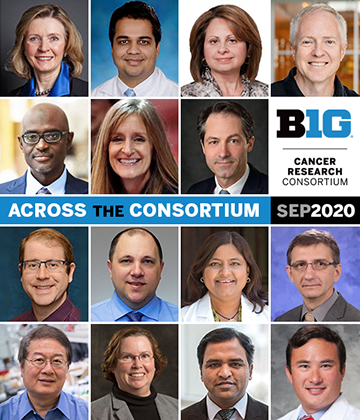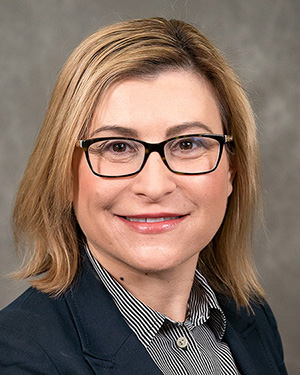September 29, 2020:
A phase Ib Big Ten Cancer Research Consortium multi-center study is testing the safety and efficacy of the monoclonal antibody gemtuzumab ozogamicin when combined with the BCL-2 inhibitor venetoclax in adults with relapsed or refractory acute myeloid leukemia.
The study is open to accrual at the University of Illinois Cancer Center in Chicago, Ill.; the Indiana University Melvin and Bren Simon Comprehensive Cancer Center in Indianapolis, Ind.; the University of Michigan Rogel Cancer Center in Ann Arbor, Mich.; and the Fred & Pamela Buffett Cancer Center at the University of Nebraska.
Acute Myeloid Leukemia, also known as AML, is a disease that occurs when the bone marrow creates abnormal myeloblasts (a type of white blood cell), or, less frequently abnormal red blood cells or platelets. In the United States, approximately 21,450 new cases occurred in 2019. Typically, adults age 65 and older are at greater risk of being diagnosed with AML and prognosis for survival remains poor, especially with relapsed or refractory disease.
People with AML are usually treated with chemotherapy and sometimes with targeted therapies.
The primary goal of BTCRC-AML17-113, “Phase Ib study of the safety and efficacy of Gemtuzumab Ozogamicin (GO) and Venetoclax in patients with relapsed or refractory CD33+ acute myeloid leukemia,” is to find the maximum tolerated dose of venetoclax when combined with gemtuzumab ozogamicin. Read More


 In this month’s Across the Consortium, the Big Ten Cancer Research Consortium (Big Ten CRC) highlights a variety of activities and accomplishments across universities. From new cancer drugs, to grant awards and new methods of treatments, researchers stop at nothing to continue to fight against cancer.
In this month’s Across the Consortium, the Big Ten Cancer Research Consortium (Big Ten CRC) highlights a variety of activities and accomplishments across universities. From new cancer drugs, to grant awards and new methods of treatments, researchers stop at nothing to continue to fight against cancer.  This month, the Big Ten Cancer Research Consortium highlights the
This month, the Big Ten Cancer Research Consortium highlights the 

 A Big Ten Cancer Research Consortium phase Ib study, led by the
A Big Ten Cancer Research Consortium phase Ib study, led by the  Jyoti Patel, MD, professor of hematology/oncology and associate vice chair for clinical research in the Department of Medicine at
Jyoti Patel, MD, professor of hematology/oncology and associate vice chair for clinical research in the Department of Medicine at  Monika D. Joshi, MD, MRCP, associate professor of medicine at
Monika D. Joshi, MD, MRCP, associate professor of medicine at 













Subscribe to the Big Ten CRC Newsletter X
X Facebook
Facebook YouTube
YouTube